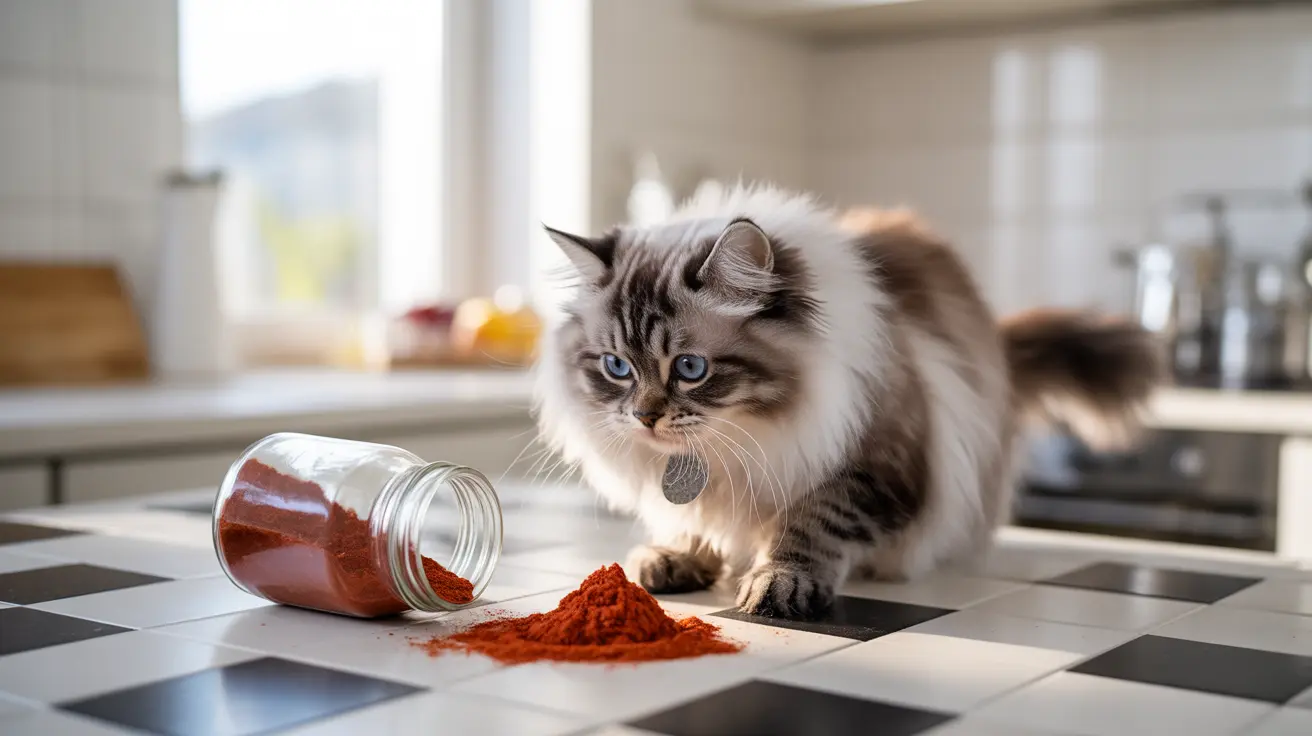Understanding Paprika and Its Effects on Cats
Paprika is a ground spice made from dried peppers of the Capsicum annuum species. While it adds delicious flavor and color to human dishes, this spice contains compounds that can be problematic for cats, particularly capsaicin, which gives peppers their heat and can irritate cats' sensitive systems.
Health Risks of Paprika for Cats
Digestive System Issues
When cats consume paprika, they may experience several digestive problems:
- Nausea and vomiting
- Diarrhea
- Stomach pain
- Excessive drooling
- Loss of appetite
Respiratory Concerns
The powdery nature of paprika presents additional risks:
- Sneezing and coughing if inhaled
- Nasal irritation
- Potential breathing difficulties
- Watery eyes
Why Cats and Paprika Don't Mix
Biological Incompatibility
Cats are obligate carnivores, meaning their bodies are designed to process meat-based proteins. Their digestive systems aren't equipped to handle spices like paprika, and they receive no nutritional benefit from it. Unlike humans, cats don't need the vitamins and antioxidants that paprika provides, as they get these nutrients from their regular cat food.
Sensory Sensitivity
Cats have much more sensitive digestive and respiratory systems than humans. Even small amounts of paprika can cause discomfort or irritation. Their keen sense of smell usually leads them to avoid paprika naturally, but accidents can happen when it's mixed into other foods.
What to Do If Your Cat Eats Paprika
If your cat has consumed paprika, follow these steps:
- Remove any remaining paprika from their reach
- Monitor them for adverse reactions
- Provide fresh water
- Contact your veterinarian if symptoms appear severe or persist
Prevention and Safe Alternatives
To keep your cat safe from paprika exposure:
- Store spices in sealed containers
- Keep seasoned foods away from your cat
- Clean up any spilled spices immediately
- Stick to cat-specific treats for rewards
Frequently Asked Questions
Is paprika safe for cats to eat or can it cause health problems?
Paprika is not safe for cats to eat. While not technically toxic, it can cause significant digestive upset, respiratory irritation, and discomfort. It's best to keep paprika and paprika-seasoned foods away from your cat.
What symptoms should I watch for if my cat accidentally ingests paprika?
Watch for signs of digestive upset (vomiting, diarrhea, drooling), respiratory issues (coughing, sneezing), and general discomfort. If symptoms are severe or persist, contact your veterinarian.
Why is paprika irritating to cats even though it is not classified as toxic?
Paprika contains capsaicin, which irritates cats' sensitive mucous membranes and digestive systems. Additionally, its powdery nature can cause respiratory irritation if inhaled.
Can paprika be used as a natural deterrent to keep cats out of gardens or certain areas?
Yes, paprika's strong scent and irritating properties make it an effective natural deterrent for cats. However, use it cautiously to avoid causing discomfort to cats who might accidentally come into contact with it.
Are there any nutritional benefits of paprika for cats or should it be avoided entirely?
Paprika offers no nutritional benefits for cats and should be avoided entirely. Cats get all their necessary nutrients from proper cat food, and adding paprika to their diet only risks potential health issues.
Conclusion
While paprika adds wonderful flavor to human dishes, it has no place in your cat's diet. The risks of digestive upset and respiratory irritation far outweigh any perceived benefits. Keep your feline friend safe by storing spices securely and sticking to cat-appropriate foods and treats.






